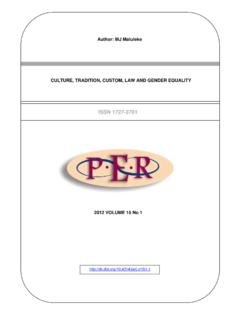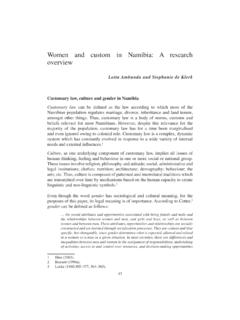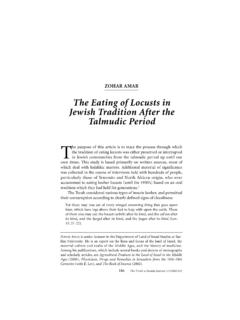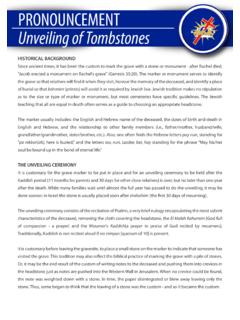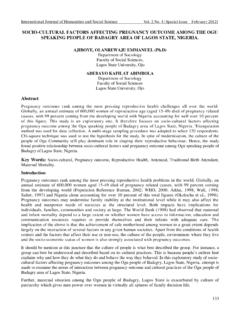Transcription of The ALRAESA Annual Conference, - Justice Home
1 LAW AND PUBLIC MORALITY IN AFRICA: LEGAL, PHILOSOPHICAL AND CULTURAL ISSUES The ALRAESA Annual conference , 4th 8th September, 2005 at Imperial Resort Beach Hotel, Entebbe, By John Mary Waliggo (Rev. Prof.) Member, Uganda Human Rights Commission 1 LAW AND PUBLIC MORALITY IN AFRICA: LEGAL, PHILOSOPHICAL AND CULTURAL ISSUES (A paper discussed at the ALRAESA Annual conference , Imperial Resort Beach Hotel, Entebbe, 4th 8th September, 2005). By John Mary Waliggo (Rev. Prof.) Introduction: I count myself very privileged to participate in this important Annual conference of experts and professionals and to share ideas on the link between law and public morality from both the African legal, philosophical and cultural perspectives and the contemporary moral and ethical aspects of globalization.
2 I thank the organizers for making this conference inter-disciplinary in nature. In my view, that is what all good laws exactly require. Key Terms Law: Among the many schools of jurisprudence, I use Curzon s Dictionary definition of law as the written or unwritten body of rules largely derived from custom and formal enactment which are recognized as binding among those persons who constitute a community or state, so that they shall be imposed upon and enforced among those persons as appropriate sanctions.
3 1 Morality derives from the Latin word Mos, plural Mores which mean customs or people s values and traditions, people heritage or ways of life and conduct in a given community. Moral values vary from community to community and from time to time. Among people who share a common heritage or have similar cultures or religious beliefs, some of these values cut across sections of the various communities. Within the societies of Black Africa, there is a shared sense of morality that is similar in many aspects and based on the key concept of Public Morality in this presentation is taken to refer to the total set of ethical-moral, legal-human rights values, customs or traditions which define, describe, promote and defend a given society s or community s common good, shared values and vision, their public ethos, and the common pursuit of the good in order to achieve their full potential and civilization.
4 Public morality regulates the behaviour and values of both the community and the individual who lives and achieves his or her full humanness within the Culture is taken to mean the sum total of the ways in which a society preserves, identifies, organizes, sustains and expresses itself .4 Culture can also be defined as the sum total of the values a particular society cherishes and by which its members want to identify themselves and be identified by others .5 These common values include among others: history and language; rites, rituals and ceremonies; wisdom, philosophy and worldview; religious beliefs and morality; ancestors and leaders; signs and symbols; 2institutions of family, clan and society as a whole; law, the legal system and the indigenous skills and technologies; education and leadership.
5 Law and Public Morality: From the above descriptions it appears clearly that both the law and public morality do regulate the relationship between individuals and between individuals and the community or the State. Morality also deals with the way an individual should conduct himself/herself in the community. Public morality and the law should more or less play the same role in society and one ought to be intrinsically integrated within other, thus creating the necessary harmony. The tension between the Law and Public Morality in Africa today Often times, however, the law seems to be divorced from public morality.
6 In the Common law tradition, the law seems in my view to concentrate on minimizing the harm that an individual may cause to another individual, while paying less attention on the harm done by the individual to the community as a whole and to the future of that community or state. Contemporary law in Africa, in following that tradition is perceived as primarily protecting the individual and his or her private interests rather than equally emphasizing the protection of the good of all in the society or community.
7 Public morality in Africa, on the other hand, is based on a strong sense of shame for the individual who acts or behaves contrary to the common good of the community and its values. It is founded on the philosophy: We are, therefore I am. 6 How do we then relate law to public morality and the individual s freedom in moral matters and the community s public morality? Laws in some Developed Countries are tending to completely deny the existence of public morality or perceiving such morality as an infringement on the individual s free moral choices.
8 In most African countries because of the different people s worldview, the law has not yet come to such extreme views of public morality. The relations between the law and public morality which I support in this paper, has many advocates both from outside Africa and within Africa itself. According to one German philosopher, Gustav Radbruch, after experiencing the Nazi tragedy was of the view that the fundamental principles of humanitarian morality were part of the very concept of legality and that no positive enactment or statute, however clearly it expressed and however clearly it conformed with the formal criteria of validity of a given legal system, could be valid if it contravened the basic principles of morality.
9 7 The above principle is what African cultures embrace in emphasizing morality more than the laws. Moral formation in Africa is given to children right from the tender age in order to acquire the habits, attitudes, beliefs, skills and motives that enable a human being to fit into the community. Each and every aspect of life contributed to the moral formation of an individual. An individual lived in and was part of the community and it was everyone s duty to uphold the community s values. Morality was and still is part and parcel of the community.
10 In traditional African societies, one finds that morality permeated every aspect of life and this had to be reflected in the laws. Laws, as we know them today were unknown and a 3society s code of behaviour, albeit unwritten, was deeply ingrained in every member of that society and this is what curbed vices and other improper behaviour. Morality, as understood in the African world-view was law in a sense. Although Austin argues that law is a command of the sovereign backed by a sanction and that since moral rules are not sent by men as political superiors and therefore not commands of a sovereign, and that they are not clothed with legal sanctions and they do not oblige legally the persons to whom they are set, they do not amount to In the African societies, there is no clear-cut distinction between law and morality since the rules of conduct did in a way amount to law.











